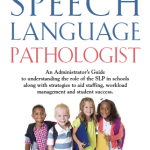Administrators: Know Your SLP’s

The biggest mistake administrators make is not getting to know their professionals. Often based on the decisions you make, things you say in meetings or even off handed comments you make it is clear to Speech Language Pathologists that you have no idea what we do, how knowledgeable we are, the resources we need to do their job better or even areas we address. When making big decisions especially those that involve procedure get your staff involved. You might be surprised at what your staff can offer. Teachers and other professional staff such as SLP’s can often be a feather in your cap if you listen to them rather than immediately disagree with them.
Learn the roll of every staff member and professional in your building or school. You never know when someone might have special training or experience to get you through a rough situation. Listen to what your staff has to say even if it’s an opinion. Successful administrators and school boards cannot have a myopic point of view. I’ve seen this happen and it does not create a strong, successful school system.
SLP’s are extremely knowledgeable. Our expertise goes beyond articulation therapy. We have training that goes way beyond academics. We know how the brain and body function together. We can pick out specific difficulties in children that can make life long differences if not remediated. We know about auditory development (not just hearing) and what happens to students who have difficulty with auditory processing, discrimination etc. We know immediately when your school system has a poor phonics program. We work on language development with severely autistic children, children with non-verbal learning disabilities and everything in-between. We work with children who have specific learning disabilities with average cognitive skills and those children who are severely learning impaired with low cognitive skills. Unless you’ve studied higher level language development you don’t have a clue it’s missing until it is almost too late. This list only hits the tip of the iceberg. I could go one and on ….. but I think you get the point.
Get to know you SLP’s and other professionals. Ask the questions and listen to them. It will only make you a better administrator.
Teresa
Schools need a timeout…….
I recently found this opinion article through the Race to Nowhere Facebook page. “Schools need a timeout on standardized tests”
This is an opinion piece by Joshua P. Starr, superintendent of Montgomery County Public Schools in Maryland. Sometimes others say the exact things you are thinking. There are three sections in his article that really struck a cord with me.
“Most U.S. public school systems are attempting to implement at least three things at once right now: revamped accountability measures, reforms as part of the federal Race to the Top program and the Common Core State Standards. This is simply too much at one time.”
I’ve worked in a few different school systems the past 7 or so years and all the changes are just too much at once. When, not if (in my opinion) the new reforms fail there will be no way to figure out which parts work and which parts don’t. This has been the history of failing education reforms. Schools tend to change things dramatically rather than work the problem.
“But these same state-level departments have been hurt by the recent fiscal crisis. Moreover, they are beholden to legislators and executives whose assumptions about public education make them more likely to endorse a continued over-reliance on standardized tests to evaluate schools and educators.”
Schools have not been given the funding, time or training to make many of these changes possible. The people making the decisions on curriculum, funding and judging success probably have little background in child development and education. In my opinion, child development is hugely overlooked and that’s one of the reasons our special education numbers are so big.
“This includes teacher evaluation systems that rely too heavily on individual student performance on the current state standardized tests — a practice I vehemently oppose.”
Classrooms and kids are more than just numbers and data. If one teacher has more special education students, more kids in crisis or more kids without home support, their scores on any classroom assessment are going to be lower no matter how gifted the teacher is. There has to be a better way.
I’m not happy with the changes I’m seeing in education and I know it is affecting our students in a negative way. In general, I see a lack of memory skills, lack of automaticity with facts and general information, poor phonological skills, decreased processing speeds, poor critical thinking skills and a general lack of background knowledge with typical students. Schools are so worried about taking data (because they have to) that key teaching opportunities are missed or there is no time in the day to take them. Changes are needed, but across the board and all at once isn’t the answer. Students and schools in different areas of the country have different needs and different problems. Some school systems are actually dumbing down their curriculum to meet Common Core Standards, others are trying to figure out how they can do this all at once and a few schools are just saying we can’t do this and handing themselves over to the state.
Schools need good curriculums to turn out good productive citizens. Losing time to practice test taking and learning a curriculum based upon a test is not going to improve or prove anything.
Never miss an opportunity to learn from another professional
College can give you a good foundation but the real learning comes once you start working. And if you’re smart you’ll learn from everyone you work with, colleagues and clients.
When I started working in early intervention 20 some years ago, I knew little about child development, family issues or caseload management. So I faked it for awhile until I was able to watch, listen and learn. Luckily it was a job where we talked and consulted a lot. We did arena assessments where one person facilitated and the rest of us observed. I was able to watch, listen and read the final reports of all professionals involved. Now that I look back I was lucky to find a first job where people really respected what you had to say and at least considered your recommendations.
During those years I watched and listened not only the other speech therapists on staff but the physical therapists, occupational therapists, nurses and social workers. The information I gathered in those two years has served me well throughout my years of working in the public schools. The biggest lesson I learned in Early Intervention was to always listen to what other people have to offer, consider their view point and if the information makes sense use it or at least remember it.
These days it pains me when I sit in team meetings and see no one taking a note as the school psychologist gives her report and recommendations, I want to stand up and yell “Write this down, this is good stuff, it will help you understand the students learning style!” In team meetings it isn’t just classroom teachers that need to take notes. If principals and vice principals were smart they would be taking notes too, so when an issue arises they can refer to the notes when dealing with special needs children and parents. When you sit in a team meeting as a passive member you are missing out on a learning opportunity. Not to mention when you also look passive or even uncaring to the parents.
Within the public schools, services can often seem so fragmented. The team meeting is one of the few scheduled opportunities to listen to and collaborate with your colleagues. Beyond that there is often little time to consult with others working with a student. However, another thing I noticed is that everyone is often on their own agenda, “only do what I have to do with the student to achieve my goal.” When you walk into a classroom and see none of the recommendations that specialists have suggested in place, you have to wonder if the teacher was listening or even considering making changes.
More than likely four things may have happened that keep the teacher from implementing accommodations, either the teacher was not present when you made recommendations in student meetings, the teachers did not even take note of your recommendations, the teachers are so overwhelmed with what they have to do it’s impossible to carryout or remember even the simplest accommodations or they have little understanding of the child’s disability or needs.
I have worked in schools where they made the teachers an important part of the meetings (hiring a sub so they could attend) and in schools where teachers buzzed in said their piece and buzzed out. When the school allows or even requires the teachers to stay in team meetings they have a much better understanding of the specialists roles and recommendations. How can you expect teachers to understand a child’s disability or unique learning style when they weren’t even there to learn from the specialists. If I was the parent I would either question or at least wonder why my child’s teacher is not present to hear this valuable information.
Like I mentioned above. I’ve sat in many meetings where not one person (other than myself) is taking notes on what any the specialists have to say, nor did they take a copies of the reports. What does that say. It says they are not taking the opportunity to learn from another professional. When learning from other professionals isn’t encouraged, it not only disrespects everyone involved but in the end the child loses out.
Are you really a co-teacher or just a glorified aid
ATTN: Now please understand I don’t mean to ruffle anyones feathers with this article. I know there are a lot of therapists who don’t agree with my position. If you have a co-teaching model or push-in therapy model that really works for your student, not for you, your schedule, your high numbers or your administration, please share it in the comments section. Please share not only your model but how the model evolved and your caseload. I base my perspective on my experiences and those who have shared their experiences with me.
The past 10 years or so there has been a big push for therapists to use a co-teaching or push-in model. I have no clue where this idea came from and I don’t feel like doing the research. I honestly think one morning someone (who does not work directly with kids) woke up and said wouldn’t it be great if the speech therapists saw their students in the classroom.
On the surface that sounds like a great idea. You have a speech language pathologist come into the classroom, imagine what they could offer. An actually if it was a true co-teaching model where the speech language pathologist worked in tandem with a classroom teacher, they planned together, delivered lessons together and evaluated the students together, that could be great. What has happened, is that therapists are being asked to provide in-class services, either planning a class activity for that time or just going in and hoping they can somehow integrate themselves into the class for that one half hour a week. On paper that too is called co-teaching (apparently co-teaching on paper looks good to the powers that be). Oh did I forget to mention that in some situations therapists are expected to do this in every single classroom.
The problem I have always had with therapists as co teachers is that we are usually told “just do it” without any regard for the student’s needs, a lack of understanding of our level of expertise, a lack of respect for what we can realistically offer, a lack of co-planning time, scheduling constraints, teachers that aren’t willing to coordinate, no planned way to measure effectiveness and no training. I have never felt that I have been able to offer my language disabled students the level “therapy” they need in the classroom setting. Never have I worked in a organized co-teaching model.
There have been times when the teachers not only ignored me in the classroom but ignored the fact that I am there to work with or at the very least observe particular students. With that said there have also been some wonderful teachers who will switch thing up a little when they see me come in to accommodate my limited time. Even with accommodating teachers, without sufficient planning and evaluation time, a therapist going into a classroom is usually no more than a glorified aid. Being a glorified aid makes my job very easy. There have been times when I have only had one or two direct or indirect interactions with my student during my 30-45 minutes in the classroom. That hardly gives me time to address or observe my goals and objectives.
I don’t really think the disconnect is so much between the teachers and the therapists, most of us are willing to learn new methods, if they’re effective. I believe the problem lies between the administration/school board and their lack of understanding about how schools work, special education and how children learn. It somehow sounds better if a school says they use a co-teaching model. Most people don’t understand how loosely that term is used.
Here is a link to 6 different types of co-teaching models. http://faculty.felician.edu/caseyb/Types%20of%20Co-Teaching%20notesheet.doc. Take a look at it and see where the services at your school fall. I can’t cite the author because there isn’t one. Another site claims 5 co-teaching models http://trailblazers.wikispaces.com/file/view/co_Teaching_Models-W.pdf. I guess my point is even people who feel strongly about co-teaching haven’t decided the best way to go. Again no author cited.
I was a huge fan of co-teaching when it was first introduced 20 some years ago. However, most schools have never been able to put in the time, energy or resources necessary to make it work. So my observations conclude that kids often miss out on valuable “therapy” time, when services are delivered within the classroom setting. That’s not to say that when they are ready to integrate newly learned skills that they can’t benefit from some services provided within the classroom setting. (then we get into scheduling issues so lets not go there).
Speech language pathologists really need to look at their overall effectiveness within the classroom setting. Are the student’s need being met? That’s the key question. If your answer to this is “no” then congratulations, you’ve become a glorified aid.
Games Can Be Fantastic Therapy Tools
I have always said that I can turn or modify any game into an educational experience. Me at my advanced years was thinking only about board games. Over the years I’ve been able to teach almost every single language skill through conventional games. Unfortunately, those days are numbered because it’s hard to collect data when your having fun.
I was extremely pleased when I came across this article on Geekslp.com Angry Birds Educational Tool. This article truly validates what I already know. I am so glad the younger generation of SLP’s are able to see the value of games in learning. I love angry birds but never even thought to bring it into my therapy as a tool but I have used it as a reward. Why I never thought of this I don’t know. This article presents an excellent perspective and shows just how creative speech language pathologists can be.
Reality is kids just don’t know how to play anymore. Our students are usually at an even bigger disadvantage for knowing how to initiate play with others, feel successful and how to accept wins/losses gracefully. Anytime we play a game with our students we are providing a learning experience that they will not get from their peers or even their parents.
I actually have a whole section on my blog called Modify that Game, which I will admit is dated with it’s information. Still the point is there, games can have educational value.
My last article on gaming was back in June.
I was following up on an article a friend sent me. Basically I said that video games are good but you would still need a skilled teacher to fill in the gaps. I’m not a video gamer so I reserved making any harsh judgements.
However, I was writing about the importance of play long before that. The Importance of Play
I am still amazed at the number of children I encounter that truly don’t know how to play and I’m not just talking about our language disabled kids. Kids are so managed these days that they are loosing their negotiation skills, critical thinking skills, imaginations, flexibility with interpersonal skills and play skills.
Recently an SLP contacted me to tell me that she was not allowed to use games in therapy any more. I thought how sad that we’ve gotten to the point where fun had to be squashed in order to make sure kids pass a test or that enough data gets collected. I figured that was the reason or that their administration was nuts.
Enjoy the articles highlighted above, put a little bit of fun into your therapy setting, worry about data collection around progress report time. Modified games can play a huge role in therapy not to mention increase motivation. Funny that it’s more accepted if the games are presented on the computer or iPad that out of a dusty old box. However, games are much easier to modify out of the dusty old box. Personally I can see the value in both conventional games and some computer games/apps. Just like conventional games and therapy games, there are a lot of junky computer games and apps that are not worth even trying out.
PPVT vs. ROWPVT Survey Results
This was an easy survey to interpret. About 80% of the therapists who responded use the PPVT and EVT combo to assess vocabulary skills. 15% are using the ROWPVT/EOWPVT combo and 5% reported using neither.
The most common response for choosing a test is because that’s what is available. With therapists moving around so much, you are usually in a position where you are using tests chosen by another therapist. Sometime the administration thinks they know better and buy the ROWPVT/EOWPVT combo because it is significantly less expensive.
No one gave any praise for the ROWPVT/EOWPVT combo but those who use the PPVT/EVT combo felt that it was reliable and give s a good overall representation of the students ability.
One person who wrote neither followed up with the following comment. “I work in a low SES school and have found that too many students score low on vocabulary measures. Low vocabulary scores reflect more on their home environment than whether they have a true language disability. A large portion of our school is also ELD.” I think this presents an interesting dilemma. I certainly understand this therapists position having worked in that type of school on a small scale. Now the school I worked in was big on developing vocabulary. However, what I noticed is that the children were being taught higher level vocabulary words without knowing a lot of lower level or basic vocabulary words. Body parts were a perfect example, most of my students did not know their smaller body parts in either language. Kids did not know word relationships or simple ambiguous words. Interestingly enough school I worked at is now using the PPVT/EVT combo as a screening tool as part of some state program. I like the idea of it but people with very little training are administering it so I of course question the reliability of the results.
Basically the PPVT/EVT combo wins as therapists choice. It’s my choice too usually but I have to admit, I’ve used the ROWPVT/EOWPVT a couple times recently. I used it either because it was quick or it is what the child had during previous testing 3 years before. It bothered me a little but no one else seemed to mind. I don’t have the comfort level with it or the experience to view it as a reliable measure. I do feel the updates they made to it have improved the test though.
Shattered
Schools I feel do their best to make their schools secure but honestly most fall very short. In most schools there is a sign that says visitor have to check in with the office. Some schools do lock their front doors and you have to be buzzed in. Visitors are often buzzed in without verbal confirmation of who they are by untrained and very busy office staff looking at a 6×6 screen. It’s also very easy to piggyback into the school if there is a person in front of you. In no school that I have ever worked in was there a locked door between the office and the rest of the school. Basically once someone is in a school they could go anywhere.
Newer schools might have a better set up with cameras and newer security systems but older schools just were not designed anticipating this type of concern. Schools were designed to make it easy for staff and students to access the office.
When I first started teaching all we ever had to practice is fire drills. Today that’s a no brainer, you line up the kids and take them outside. Lockdown procedures began for me about 5-6 years ago. I took this seriously but also knew that they fell far short of really being able to protect children. To initiate lock down an announcement is made. Hopefully, a teacher is actually able to hear and attend to the announcement. I could also see situations where the announcement could not get sent out. We were asked to use our own cell phones incase of emergency, then told to slip either a green or red card outside our locked door to tell them if we were ok or not. To me that was like saying “here we are.” One day we had a power outage and the principal asked me to go around and ask the teachers to turn on their cell phones so they could be contacted, well over half either had no power or left them in their car. Another school I worked at in an urban area as recently as 2 years ago didn’t even know what I was talking about when I asked about their lock down procedures. Even something as simple as everyone having a good functioning room key to lock doors is often a complicated procedure in school systems. Security seems to depend greatly on the beliefs and efforts of the school system and local law enforcement.
Sadly it is doubtful that anyone other than law enforcement could have stopped this monster from getting into the school and killing these children. If he didn’t have access to guns he would have found another way. In the days to come we might find out why he did this or if he was showing any behavior that could have indicated he was capable of this. Was this a planned or spontaneous act. Is it even going to matter unless we are able to identify these individuals and intervene. Is that even possible?
Every school system in America is thinking about how they should improve their school security this morning. I’m almost sure that in the long run little will be done to make schools safer. Schools will talk about it at every school committee meeting, some will hire consultants, a few will put new or updated procedures in place, a select few will actually make the expensive changes needed that will actually be somewhat effective. Part of the problem with this is that most communities do not want to believe something this tragic can happen there. Especially communities where many don’t even feel they have to lock their doors. Administrators with no security training or never having even experienced living in areas where crime is an issue are not equipped to make security decisions or plans. Law enforcement needs to step in and design the security for school buildings. In many situations I am not confident that local law enforcement will even take it seriously enough.
I can’t even imagine the grief Newtown Ct. is feeling today. This is no doubt a parents, teachers, first responders, community and even nations worse nightmare come true. My condolences and prayers go out to everyone directly effected by this horrible tragedy. I am so sorry this happened.
Entrance and Exit Criteria
With every job I’ve ever had the administration, in an effort to decrease numbers always wants the speech language pathologists to develop Entrance and Exit criteria. This comes up every few years. Most schools will pull out an old document written in 1988 or so that is apparently their formal E&E criteria. This document is usually very vague and no one even knew it existed. I picture the therapists from the 80ies with big hair and scarves around their necks putting together something to appease the administration and to account for their consulting time together. I also picture one therapist doing most of the work by hand the night before it was due.
I have never worked in a system that “made” the therapists follow their E&E criteria. Still every system thinks this is a good idea. In theory I understand what they are going for and why they want it. Staffing is short, money is tight and we really don’t want kids missing too much class time. However, for administrators to say lets create E&E criteria and think this will solve any of the therapy woes they are sorely mistaken and once again it’s clear that they don’t understand how speech language pathologists function.
When we use standardized testing, specific guidelines have been created within those tests and subtests to determine the child’s level of functioning. This has been done through trials, studies and research in a very formal manner to make the testing reliable. It’s all written in the parts of the manual we don’t usually read. With most of our testing if skills fall below 1 standard deviation of average, the child is suspected of having a disability. Then we use our skills to look at the overall testing to analyze irregularities such as gaps between subtests and other testing, manner of performance during testing, we might look at item analysis to see if there’s a specific patterns, we might compare skills to cognitive ability, we consider other testing and a whole host of things. Today we also look at how students function within the classroom setting and how well they scored on state mandated testing before the team determines services. (Unfortunately these days a kid might not get the service they need if they have been too well trained in how to take state mandated tests and received a good score there or too many kids are pushed toward direct services because they haven’t achieved a good score) Given all those variables and the fact that every child is totally unique, it is almost impossible to come up with specific E&E criteria. As therapists we could come up with hundreds of scenarios where the students did not fit the one standard deviation below pattern, but the kids clearly needed services.
I have read some E&E criteria over the years that says not to pick up a student unless they are 1 1/2- 2 standard deviations below average. I always found that strange since the testing guidelines in the manuals are always clear on what they consider below average. I’ve always interpreted that as the school system saying “all our students are low functioning, you’re nothing special, not low enough.” If that is the case in any school there is something wrong with their curriculum.
I think our Entrance and Exit criteria guidelines are pretty well defined by the tests we give. For a school system to make up their own guidelines that are less strenuous than the ones provided in standardized testing is very arrogant. I would also have to wonder how these decisions would hold up in court if ever questioned.
Below is a very quick survey on Entrance and Exit Criteria. I want to know what other schools use for E&E criteria. I’m hoping to find documents and ideas out there that are different than the ineffective ones I’ve seen over the years.
Press next to proceed to the survey
Out of Range Testing for Severely Impaired Students
This question has come up again? Many therapists are put in positions where they have to test severely involved students who are perhaps not even on their caseload or in outside placements. I know the law says we have to test but how do you do this and make it valid. As far as I know other than some checklists, there is nothing out that that really looks at functional language. I’ve seen the checklists and often you have to modify them to fit the students needs and levels. Then what do the results tell you anyway? There’s usually not cut off to say therapy will be beneficial or not or even guidelines to help you with goals.
Seriously, how do you put an age or level on the language of the severely impaired. There must be a way to describe language or a tool out there that might help. If you have any suggestions please share. I may even consider a short survey to see what others are doing.
Back in February I wrote this article on evaluating out of range students. Some of the suggestions work for me but I’m not sure it is the best way to evaluate. Out of Range Testing for Severely Impaired Students
Survey Says……..(with comments)
Thank you to the Speech Language Pathologists who participated in this speech and language assessment survey. I received responses from 9 people. Granted that isn’t a large number but I’ve read scholarly papers written with less data. I’m using the acronyms in this report since we all know what they are:). Sorry about the comments but I couldn’t help myself. It is my survey so I can do that. Please feel free to share your comments and questions.
What is your standard test battery?
The CELF-4 was the overwhelming test of choice for most therapists. The CASL and the OWLS were most frequently mentioned as second choices. For vocabulary testing most preferred the PPVT/EVT combo to the ROWPVT/EOWPVT. Then there is the good old Goldman Fristoe. What else could you use for articulation? It’s quick, it’s familiar. It’s old but really articulation is the one thing that hasn’t changed.
The tests mentioned for assessing higher order language included the TLC and the TAPS-cohesion subtests. The TOLD and PLS were mentioned for younger students.
What supplementary testing do you use for more involved children or for specific information?
- TOPS
- Parts of the CASL
- CTOPP
- LPT
- TOPL
- Social Language Development Test
- Listening Comprehension
- SSI
- SPELT
- Brigance
I can say that I am familiar with almost all the supplementary testing mentioned on the survey and use several. I prefer the test of problem solving to the TOPL because of the breakdown into skill areas. However, I’ve only read the TOPL not given it. I have the CASL available but just can’t bring myself to take the time to learn something new. I usually fight with the reading specialists on who will give the CTOPP. If you’re smart you’ll let them win. I purchased the Listening Comprehension Test but have yet to use it. I recently viewed a old and copied version of the SSI. Didn’t use it but did use a similar process to gather data. I actually found a great stuttering resource on the State of Tennessee site http://www.state.tn.us/education/speced/doc/71309SLIfluency.pdf Never heard of the The Structured Photographic Expressive Language Test (SPELT) but it sounds interesting and quick to give.
No one mentioned using Test of Written Language, but I read it in reports all the time. Next survey will include that as a question. I personally don’t work with kids enough hours a week to make an impact with their written language, too much follow up is needed to teach the editing process correctly. Plus I feel you have to be able to organize your language orally before there is going to be any significant improvement with writing. Just and opinion.
What drives your test choices?
Most respondents felt that their experience was the main factor when choosing tests to give. A small percentage of the respondents also felt that test availablity, time, administration and curriculum also drove their choices.
Does your school provide up to date testing materials?
Over half of the respondents said that their school does not provide up to date materials. We all know this is a big mistake on the school systems part. I know from personal experience that some school administrators see the importance of this and some don’t. Your testing could be judged invalid if you don’t have up to date or the right materials. Parents are smart these days and don’t hesitate to request an outside evaluation if they don’t feel the assessment at schools is an appropriate one.
Does your school copy protocol sheets?
Approximately 3/4 of the respondents said that sometimes they have to copy protocols and 1/4 said they always have to copy. We all know it happens and it is understandable that you might run out once in awhile. I’ve worked in a few systems where copying was the norm rather than the exception. I don’t know the law but I am assuming copying protocols must violate some copyright law. However, I also know that the protocols I use go into a personal file when testing is over rather than the students file at school.
The other problem with copying is that it makes testing more difficult and time consuming. Often the correct responses are color coded to make life easier. I won’t give up that luxury anymore. During an interview I asked about testing material and protocols. The blatantly told me they copy all their protocols. I blatantly told them (but nicely) that I wouldn’t use copied protocols. We’ll I didn’t want the job anyway.
Do you feel your given enough time to give and produce comprehensive and detailed evaluations?
Not surprisingly the overwhelming response here was a big NO. People not only end up with no writing time, many respondents said that schools also make it challenging to find time to do the actual testing.
How long do you spend testing a student?
Granted this greatly depends on age and specific needs. Respondents specified anywhere from 2-4 sessions ranging from 30-60 minutes a session.
How long do your write ups take?
Write ups take anywhere from 1-6 hours. I should have added a clarifying question on survey. How long is your report? I know my evaluations are usually 6-8 pages in length but much of that is the standard template. One respondent mentioned a short evaluation sheet that they fill out. Length doesn’t necessarily mean quality so I would like to see a shorter form. Maybe even consider using it.
It is clear that expectations for write ups must vary from school to school. I would bet vary from type of community to type of community is more like it. Who your writing for and how much written analysis you have to do shouldn’t but might dictate how thorough you are. I try very hard to do the same for everyone.
Do you have testing time and writing time in your schedule or do you cancel students to get testing done?
Almost 3/4 of the respondents said they had to cancel students to get testing done. Glad to hear I’m not the only one who has had to do that over the years. It’s not the rule but it happens more often than one might think. I hate it and feel extremely guilty because a student had to miss out. Rule of thumb always let the administration know that you have/had to cancel students to get testing done to meet deadline….in writing. they need to know the situation and they need to take responsibility for it.
How many evaluations do you do in a year?
The average seems to be around 30 with a range of 15-40. I know this number can be so random based on caseload size, three year re-evaluation schedules, teacher referrals and parent requests. One year you may have 30 to do and the next year 15. If you have a caseload of 60+ you are doing a lot more. This year I am doing just testing at one of my schools which means I will easily clear, probably 40 evaluations this year.
Do you feel confident and competent when testing and analyzing data?
Almost 3/4 of the respondents said they felt confident with their assessment skills. The other 1/4 said they feel confident most of the time. That’s actually not a bad thing because I feel that leaves you more open minded and willing to learn from others.
Does your testing usually line up with the academic and psychological testing?
Almost 100% of the respondents said yes. I love it when that happens. The team looks so professional.
Feelings about testing
Most therapists preferred to do their own testing because it helps them analyze skills, write goals and plan therapy. Only about 1/8 of the respondents secretly wished that students went out for testing. If I had to guess those feelings are probably related to the report write up rather than doing the actual testing. Only one respondent said they did not like testing. Personally I’d rather write up a evaluation report than a progress report any day.
The report itself
Over 3/4 of the therapists reported using a template or series of templates to make report writing easier. Almost all reported that their reports provided descriptions of the test and what they measure.
The procedure and expectations for making recommendations varied greatly. Some make general recommendations in their report and specific ones at the meeting. Some are required to make recommendations and were cited when they didn’t. I am working in a couple of different systems this year and find that different schools do want it done differently. It guess just depends on who is interpreting the rules and laws. I’d love to find out more about this.
Do Speech Language Pathologists in your district meet on a regular basis and consult?
Most of the respondents stated that they do get together with other therapists in their district. However, not always on a regular basis and with very few relevant common goals in mind. I know that is often administration driven and they tell you what they want you to work on.
Almost all respondents said that they have other therapists in their district that they could consult with. One respondent mentioned approximate 30 SLPs in her district and they felt this was their greatest strength. I would love to know if systems that big have any more power around appropriate caseload/workload, more time for paperwork duties (because of the large numbers or workload) and other issues that only concern SLP’s.
Do you feel teachers value the information you give them and use it in their programming?
Therapists were split about 50/50 on this. Some teachers use the information we provide, some just want the kids identified and one mentioned rarely seeing a teacher take a note during team meetings. I’ve worked in school systems where the teachers present then leave while the rest of us discuss the meat and potatoes of the evaluations and programming. I think they have it wrong. Teachers need to hear what we have to say and learn from us like we learn from them. I think it comes down to our identity in the schools system and few understanding our knowledge and expertise.
Conclusions
Everyone uses a similar battery of tests. The time factor is still an enigma to me. Some take a lot of time to complete testing and some don’t or can’t. I think it is hard to thoroughly judge this since the end products cannot be compared. Perhaps that is a study for another time, “report write ups.” I would like to know if I could do things better and quicker.
Seems like we’re all almost on the same page and we face the same challenges. There is never enough time in our day to complete even the most critical work. Schools don’t seem to understand that when our work is lacking because of time constraints the whole program looks sloppy and unprofessional. I’ve sat in very professional meetings and meetings that were run very inefficiently. There is a difference and some parents do know. I would bet that systems who are constantly battling with parents and/or sending kids out for evaluations, are systems where everything is done on the fly.
This was a fun survey to do and it raised all kinds of questions in my mind. Hopefully I will get to follow up on this in the very near future.











